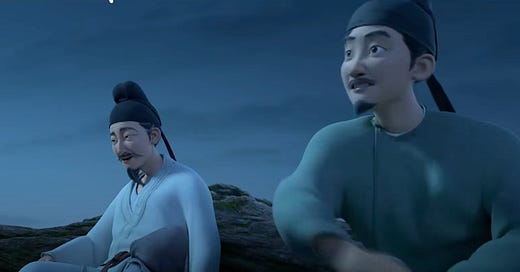Li Bai to Du Fu: Wish You Were Here
On the friendship between Li Bai and Du Fu, the two greatest Tang poets
“In 4,000 years of history,”1 the poet Wen Yiduo wrote, “with the exception of Confucius and Laozi, no other meeting has been so important, so sacred, so worthy of memorialization” as that of Li Bai (701-762) and Du Fu (712-770), whom later tradition would call “the Poet-Transcendent” 詩仙 and “the Poet-Sage” 詩聖. It isn’t hard to see why so much has been made — most recently in the 2023 3D animated film Chang'an 长安三万里 — of the friendship between the two men. But the evidence points to something more interesting, I think.
Du Fu 杜甫 - To Li Bai 贈李白
秋來相顧尚飄蓬,
未就丹砂愧葛洪。
痛飲狂歌空度日,
飛揚跋扈為誰雄?Autumn’s come. I look at you: Still a tumbleweed adrift. Still no key To immortality. You’re no master alchemist. Rip-roaring drunk, Bellowing songs, Empty day emptying into empty day. Your flourishes, All your bravado — Whose hero are you playing?
Poems like the one above, written to a poet who was already famous by a starstruck younger man who would die unappreciated in his own century, testify to that friendship — Li and Du definitely did meet and spend time together; that’s not in question — but poems were the basic coin of social engagement, and Du Fu kept everything.2 There's no question that he admired Li Bai and enjoyed his company, but there have been few keener judges of character than Du Fu, and none so exquisitely attuned to irony, nor so deft at balancing contradictory emotions. Read them again through the eyes of the Poet-Sage, and Li's famous carousings and solitary wanderings suddenly sink a little closer to Earth under merely human weight, and the Poet-Transcendent becomes, at least potentially, a mortal man who never managed to transcend his own condition.
Going by the evidence — a dozen or so surviving Du Fu poems to and about Li Bai written over the course of his life, versus two Li Bai poems in the opposite direction — the Du Fu/Li Bai relationship was a pretty one-sided one. But that evidence! Even if their friendship seems largely to have been imagined into being by later centuries, Li Bai's “wish you were here” to Du Fu will make you want to believe.
Li Bai 李白 - To Du Fu, from Shandong 沙丘城下寄杜甫
我來竟何事,⾼臥沙丘城。
城邊有古樹,⽇夕連秋聲。
魯酒不可醉,⿑歌空復情。
思君若汶⽔,浩蕩寄南征。And how have I been spending my time?
I’ve been here in Shaqiu: splendid isolation.
There are old trees by the city walls,
And day and night the autumn whispers through them.
Shandong wine can’t get me drunk.
The local poets leave me cold.
I'm thinking of you: thoughts like the River Wen,
Surging, churning, ever south.
(Thanks to Tom Mazanec for suggesting the idea of translating seven-character lines as triplets — someone should tell his publishers that they’re the waste of space.)
A lot happened in the 20th century.
The Complete Poems of the Tang contains over 1400 poems attributed to him, on topics ranging from the disastrous rebellion of the general Roxshan (An Lushan < Common Phonology *Luk-sran) to a gift of 30 bunches of chives. One of Du Fu’s most singular qualities is that he doesn’t seem to have had a strong sense of what was or wasn’t in the realm of poetry: he’s almost diaristic at times.




Triplets, yes! I like triplets for the couplet. There's often too much in a couplet to contain easily in an English couplet, and a triplet structure allows you a bit of freedom to bring out unstated implications, if necessary.
And cartoon Chang'an, yes! It's remarkably watchable.
I believe the correct term is tercet. If the three lines followed the AAA rhyme scheme, then it would be a triplet.